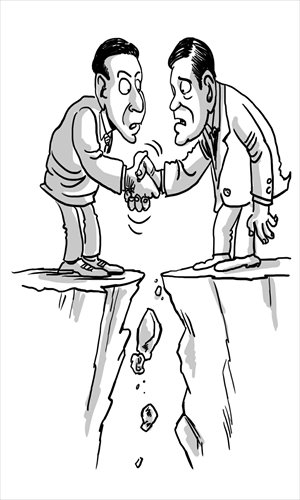Chinese fear burnt hands in Myanmar

Chinese President Xi Jinping on April 5 held talks with Myanmar President U Thein Sein, who was attending the Boao Forum for Asia annual conference 2013 in Hainan Province. China is the biggest investor of Myanmar with a total investment of over $20 billion, however, major cooperative projects of symbolic significance between China and Myanmar have suffered successive frustrations in recent years.
The multibillion-dollar Myitsone Dam was suspended in September 2011 and so far, there has been little hope for restoring construction. The Letpadaung copper mine project, in which a Chinese State-owned enterprise invested about $1.065 billion, was forced to stop construction by local protestors. Although an investigation report in March showed the project should continue after some adjustments, some opposition organizations and activists are still mobilizing protests.
Another target of some anti-Chinese activists is the China-Myanmar oil and gas pipeline that is due to be completed at the end of May. Extreme voices are calling for ending all the deals reached between China and the former junta.
Under such conditions, Chinese enterprises are deeply worried about their investments' security in Myanmar and reluctant to make new investments. Meanwhile, Western enterprises are ambitious to compete with their Chinese counterparts over the Myanmar resources and markets. Some Western public opinion even criticizes Chinese enterprises for allegedly damaging the environment and grabbing resources in Myanmar, instigating anti-Chinese sentiments among the public.
Economic cooperation between China and Myanmar may be bogged down. But as neighbors, the destiny of China and Myanmar is closely tied. The problems need to be tackled rationally by people on both sides, aiming at the long-term welfare of the public, upgrading economic cooperation and building a community of mutual benefit and common prosperity.
Both countries should have confidence in the huge potential for economic development, given complementary economies and broad prospects for cooperation. China has vowed to double its GDP and per capita income by 2020 from 2010 levels. The rapid economic development of China will be the engine for global economic growth for a long time.
Myanmar's democratic reforms are in full flight, with the aim of building the country into a developed democratic country by 2030. The Asian Development Bank sees Myanmar as a new economic rising star.
Currently, the Western enterprises are strongly probing Myanmar while investing little. They are not willing to invest in infrastructure due to low profits. In contrast, China is experienced in reform and opening-up and Chinese enterprises are willing to invest in Myanmar's infrastructure and help the country to improve economic development conditions.
Myanmese politicians, including the president, have called many times for more investments from Chinese enterprises. The government didn't suspend the Letpadaung copper mine project despite strong protests. The investigation committee led by opposition leader Aung San Suu Kyi came up with a scientific and just conclusion over the project and tried to give it a push.
In the future, the two governments and enterprises on both sides should negotiate to establish a mechanism of risk prevention and crisis solving to ensure interests of joint ventures and sustainable cooperation.
Chinese enterprises should learn the situation of reform in Myanmar. They should study the relevant laws, regulations and notices issued by the Myanmar government, new standards of environmental protection and corporate social responsibilities and Myanmar's evolving civil society.
Chinese investments should focus more on industries like agriculture, textile, processing and manufacturing, communications, new energy development, finance, tourism and port construction, which could help produce more job opportunities, improve local personal income and benefit the public directly.
Besides, Chinese enterprises should respect local customs and actively carry out corporate social responsibilities. They should build good relationship with local officials, businessmen, and scholars as well as the media. Chinese enterprises should shape a positive image among the Myanmese public and seek their support.
Only when China and Myanmar can overcome difficulties and improve cooperation can the two countries realize mutual development and prosperity and achieve their goals of building powerful nations and making the people rich.
The author is a research fellow on Myanmar studies in the China Institutes of Contemporary International Relations. opinion@globaltimes.com.cn